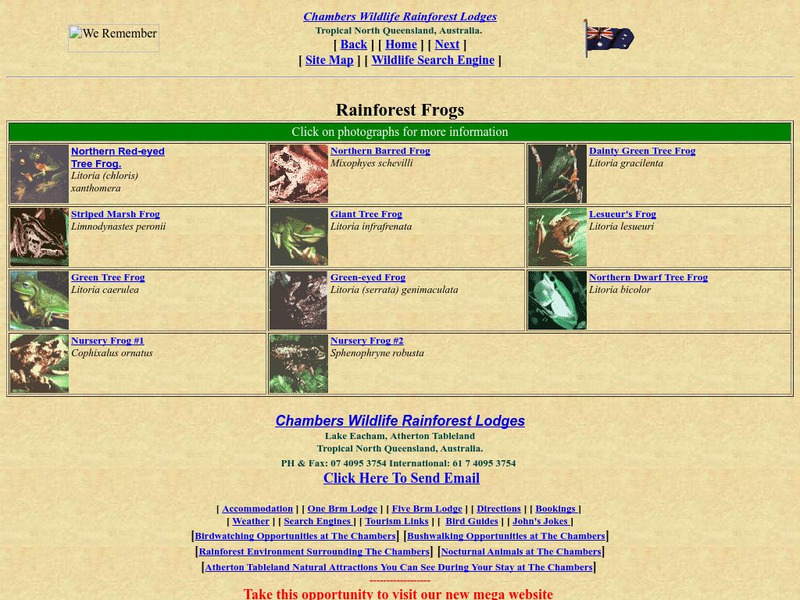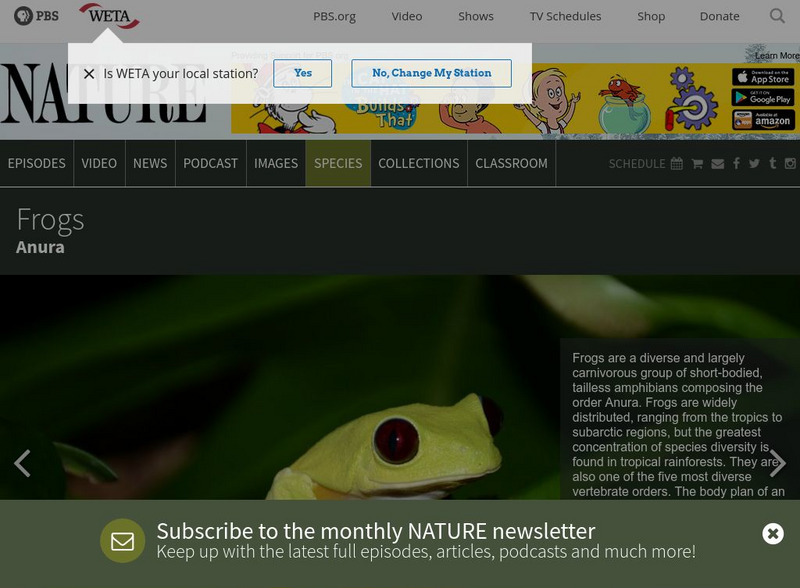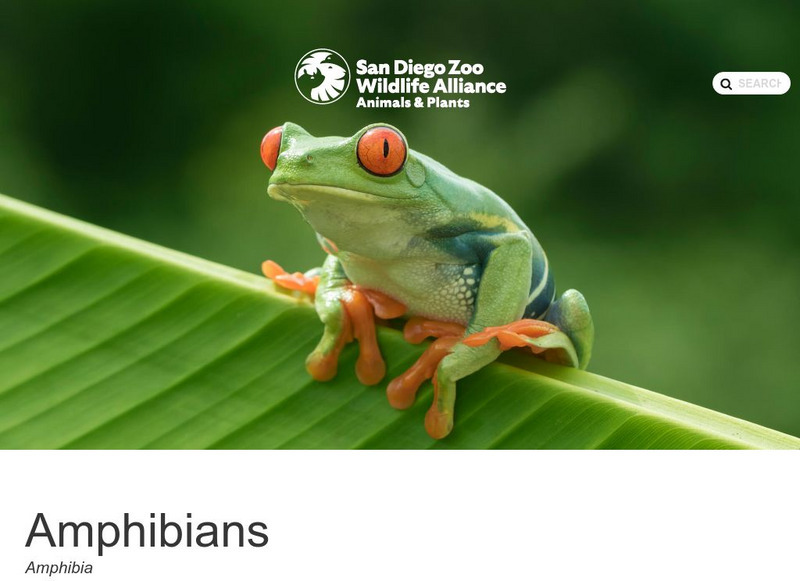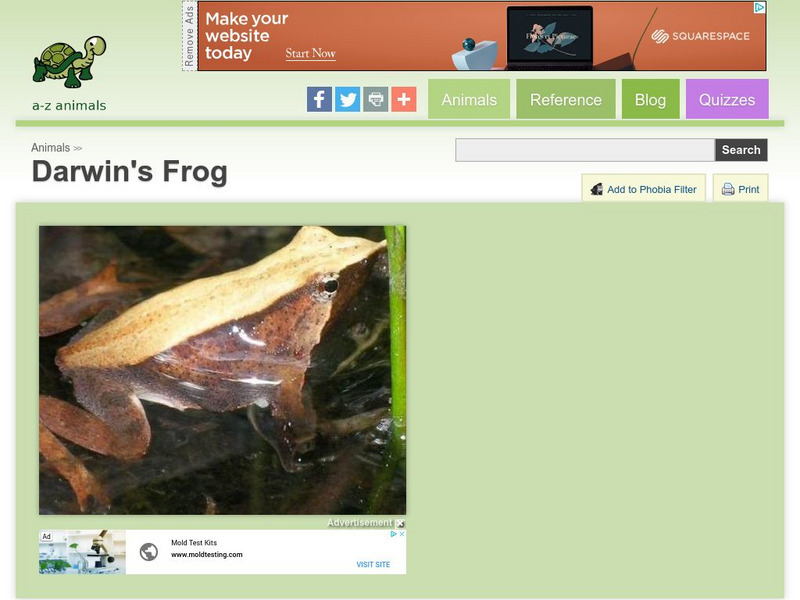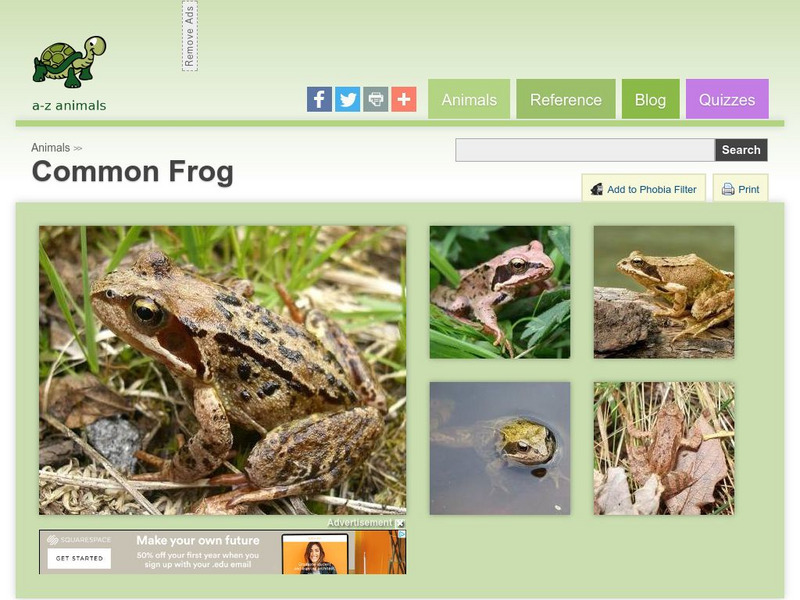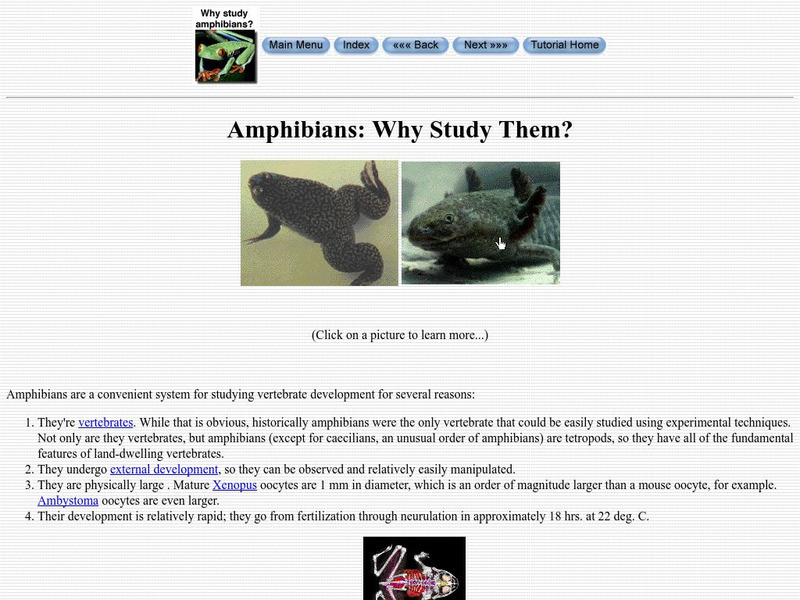Environmental Education for Kids
Eek!: Amphibians
Amphibians are cold-blooded, smooth-skinned vertebrates. Most live some of their life in water and some on land. The most common amphibian critter is a frog but there are many others. Read about Wisconsin's many amphibians here.
San Diego Zoo Global
San Diego Zoo: Frog and Toad
This excellent resource from the San Diego Zoo presents extensive information on frogs and toads including details about their habitat, physical characteristics, size, diet, family life, conservation status, and fun facts. Audio clip...
San Diego Zoo Global
San Diego Zoo: Poison Frog
This excellent resource from the San Diego Zoo presents extensive information on poison frogs including details about their habitat, physical characteristics, size, diet, family life, conservation status, and fun facts.
Oakland Zoo
Oakland Zoo: Poison Dart Frogs
Meet the poison dart frog and discover fascinating facts and statistics. Learn about its physical characteristics, habitat, diet, behavior, breeding patterns, conservation, and more.
Oakland Zoo
Oakland Zoo: Panamanian Golden Frog
Meet the Panamanian Golden Frog and discover fascinating facts and statistics. Learn about its physical characteristics, habitat, diet, behavior, breeding patterns, conservation, and more.
Oakland Zoo
Oakland Zoo: Amazon Milk Tree Frog
Meet the Amazon Milk Frog and discover fascinating facts and statistics. Learn about its physical characteristics, habitat, diet, behavior, breeding patterns, conservation, and more.
Oakland Zoo
Oakland Zoo: Golden Mantella Frog
Meet the golden mantella frog and discover fascinating facts and statistics. Learn about its physical characteristics, habitat, diet, behavior, breeding patterns, conservation, and more.
Other
All About Frogs: Life Cycle of a Frog
Understand the reproduction and life cycle of a frog from mating through spawn, eggs, tadpoles, and growing legs to the final frog. Nice details.
University of Michigan
University of Michigan Critter Catalog: Amphibians
This site provides a general description of amphibians and then describes in detail the characteristics of local animals in southern Michigan. Pictures, classification information, and sound clips of some amphibians are provided.
Other
Australian Rainforest Wildlife: Rainforest Frogs
Here you can find information on the frogs found in the Australian rainforest. Select a species for a photo and more detail.
PBS
Pbs Nature: Frogs and Toads
Do you know how to tell the difference between a frog and a toad? This site provides interesting facts and information about this type of amphibian from where they live to what they eat and more.
San Diego Zoo Global
San Diego Zoo: Amphibians
This resource offers extensive information about amphibians. Visitors can click on the listed amphibians for further information.
A-Z Animals
A Z Animals: Animal Facts: Darwin's Frog (Rhinoderma Darwinii)
Explore the world of Darwin's Frog, named after Charles Darwin. Students will gain a greater understanding of this amphibian through statistics and information on their appearance, diet, habitat, and more.
University of Wisconsin
University of Wisconsin: Amphibian Embryology Tutorial
This amphibian embryology tutorial takes an in depth look at the question "Why study amphibians?". Through this tutorial students will develop a better understanding of vertebrate development.
A-Z Animals
A Z Animals: Animal Facts: Common Frog (Rana Temporaria)
Explore images and facts about the Common Frog, including details on their appearance, habitat, diet, and mating habits.
Other
San Francisco Zoo: Poison Dart Frog
Meet the poison dart frog, discover fascinating facts, and learn about their physical characteristics, diet, habitat, behavior, and conservation status.
San Diego Zoo Global
San Diego Zoo: Kids: Poison Frog
Colorful resource for learning fun facts about poison frogs with photographs as well as information regarding their physical characteristics and unique features.
University of Michigan
University of Michigan Critter Catalog: Frogs & Toads
This competent site provides general information about amphibians and then focuses on the amphibians found in southeastern Michigan. Information, pictures, sound clips, and classification groupings are provided.
Oakland Zoo
Oakland Zoo: Green Mantella Frog
Meet the Golden Mantella and discover fascinating facts and statistics. Learn about its physical characteristics, habitat, diet, behavior, breeding patterns, conservation, and more.
A-Z Animals
A Z Animals: Animal Facts: Pool Frog (Pelophylax Lessonae)
Provides photographs and a fact card about the pool frog. Discusses where they are found, habitat, physical characteristics, diet, predators, reproduction, and population status.
A-Z Animals
A Z Animals: Animal Facts: African Clawed Frog (Xenopus Laevis)
Explore the world of the African Clawed Frog and gain a greater understanding of this amphibian through statistics and information on its appearance, habitat, behaviour, diet, and more.
University of Wisconsin
Amphibians: Why Study Them?
A basic description of why we study amphibians. This site contains an interesting three-dimensional reconstruction of a frog skeleton.
Chicago Zoological Society
Chicago Zoological Society: Zoo Explorer: Blue Poison Frog
In addition to quick facts, the Brookfield Zoo provides the lowdown on the social and eating habits, appearance, habitat, and other characteristics of the blue poison frog.
Encyclopedia of Life
Encyclopedia of Life: Amphibians
Thorough resource investigates amphibians with a description, pictures, and maps. Includes facts on ecology, evolution, biology, and external links.



